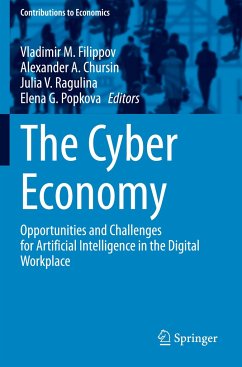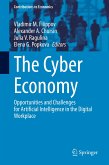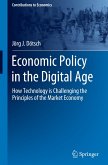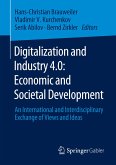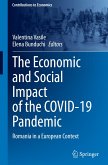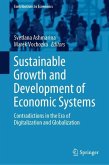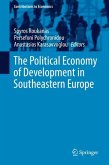The Cyber Economy
Opportunities and Challenges for Artificial Intelligence in the Digital Workplace
Herausgegeben:Filippov, Vladimir M.; Chursin, Alexander A.; Ragulina, Julia V.; Popkova, Elena G.
The Cyber Economy
Opportunities and Challenges for Artificial Intelligence in the Digital Workplace
Herausgegeben:Filippov, Vladimir M.; Chursin, Alexander A.; Ragulina, Julia V.; Popkova, Elena G.
- Broschiertes Buch
- Merkliste
- Auf die Merkliste
- Bewerten Bewerten
- Teilen
- Produkt teilen
- Produkterinnerung
- Produkterinnerung
The transition to Industry 4.0, and the subsequent ubiquitous digitalization and integration of artificial intelligence (AI) into the economic system, has set the stage for a fundamental change - one towards forming a cyber economy: a type of economy in which humans are economic subjects who interact with or are confronted with AI. This book examines these interactions and specifically analyzes the overall effects of digitalization on the workplace, and on the economic system of the future. Scholars from a diverse range of fields address both the challenges and opportunities of using AI in…mehr
Andere Kunden interessierten sich auch für
![The Cyber Economy The Cyber Economy]() The Cyber Economy117,99 €
The Cyber Economy117,99 €![Economic Policy in the Digital Age Economic Policy in the Digital Age]() Jörg J. DötschEconomic Policy in the Digital Age88,99 €
Jörg J. DötschEconomic Policy in the Digital Age88,99 €![Digitalization and Industry 4.0: Economic and Societal Development Digitalization and Industry 4.0: Economic and Societal Development]() Digitalization and Industry 4.0: Economic and Societal Development95,99 €
Digitalization and Industry 4.0: Economic and Societal Development95,99 €![The Economic and Social Impact of the COVID-19 Pandemic The Economic and Social Impact of the COVID-19 Pandemic]() The Economic and Social Impact of the COVID-19 Pandemic125,99 €
The Economic and Social Impact of the COVID-19 Pandemic125,99 €![Sustainable Growth and Development of Economic Systems Sustainable Growth and Development of Economic Systems]() Sustainable Growth and Development of Economic Systems125,99 €
Sustainable Growth and Development of Economic Systems125,99 €![Redesigning Organizations Redesigning Organizations]() Redesigning Organizations37,99 €
Redesigning Organizations37,99 €![The Political Economy of Development in Southeastern Europe The Political Economy of Development in Southeastern Europe]() The Political Economy of Development in Southeastern Europe74,99 €
The Political Economy of Development in Southeastern Europe74,99 €-
-
-
The transition to Industry 4.0, and the subsequent ubiquitous digitalization and integration of artificial intelligence (AI) into the economic system, has set the stage for a fundamental change - one towards forming a cyber economy: a type of economy in which humans are economic subjects who interact with or are confronted with AI. This book examines these interactions and specifically analyzes the overall effects of digitalization on the workplace, and on the economic system of the future. Scholars from a diverse range of fields address both the challenges and opportunities of using AI in business sectors, as well as the role of people dealing with digital channels. In closing, the book discusses the need to, and options for, training and educating the labor force in the digital age.
Produktdetails
- Produktdetails
- Contributions to Economics
- Verlag: Springer / Springer International Publishing / Springer, Berlin
- Artikelnr. des Verlages: 978-3-030-31568-9
- 1st ed. 2019
- Seitenzahl: 352
- Erscheinungstermin: 19. Dezember 2020
- Englisch
- Abmessung: 235mm x 155mm x 20mm
- Gewicht: 534g
- ISBN-13: 9783030315689
- ISBN-10: 3030315681
- Artikelnr.: 60562016
- Herstellerkennzeichnung Die Herstellerinformationen sind derzeit nicht verfügbar.
- Contributions to Economics
- Verlag: Springer / Springer International Publishing / Springer, Berlin
- Artikelnr. des Verlages: 978-3-030-31568-9
- 1st ed. 2019
- Seitenzahl: 352
- Erscheinungstermin: 19. Dezember 2020
- Englisch
- Abmessung: 235mm x 155mm x 20mm
- Gewicht: 534g
- ISBN-13: 9783030315689
- ISBN-10: 3030315681
- Artikelnr.: 60562016
- Herstellerkennzeichnung Die Herstellerinformationen sind derzeit nicht verfügbar.
Vladimir M. Filippov is the rector of the Peoples' Friendship University of Russia (RUDN), Moscow and a member of the Russian Academy of Sciences. He has a PhD in physics and mathematics. He is the author of more than 200 scientific works, including 30 monographs, of which two were published with the American Mathematical Society. Alexander A. Chursin is the deputy director of the "Institute of World Economics and Business" and the head of the Chair in Applied Mathematics of the Peoples' Friendship University of Russia (RUDN), Moscow. He has a PhD in Economics. He is the author of many scientific monographs and articles. Julia V. Ragulina is a professor and the head of the Chair of Compliance and Controlling at the Peoples' Friendship University of Russia (RUDN), Moscow. She is the author of more than 200 publications on state control and audit, state and municipal management, economics of municipal entities, and interaction of state and business. Elena G. Popkova is a doctor of science (economics), leading researcher of the Chair of Management Theories and Business Technologies, Plekhanov Russian University of Economics, Moscow, Russia. Her academic interests include economic growth, sustainable development, globalization, humanization of economic growth, developing countries, institutionalization of social development and strategic planning.
Part I.- The Cyber Economy as a New Type of Economic System Under the Conditions of Industry 4.0.- The Cyber Economy as an Outcome of Digital Modernization Based on the Breakthrough Technologies of Industry 4.0.- Digital Business in the Cyber Economy: The Organization of Production and Distribution Based on the Breakthrough Technologies of Industry 4.0.- The Cyber Economy and Digitization: Impacts on the Quality of Life.- State Regulation of the Cyber Economy Based on the Breakthrough Technologies of Industry 4.0.- Diversification of Issued Goods as the Basis for Stable Economic Development Under the Conditions of the Cyber Economy.- Preconditions for the Transition of Developed and Developing Countries to the Cyber Economy Through the Process of Digital Modernization.- Part II.- The Role of Intelligent Machines in the Cyber Economy.- Managing the Provision of Resources for the Creation of Products to Rapidly Develop the Cyber Economy.- The Logic and Principles of Intelligent Machines' Decision-Making in the Cyber Economy.- Intelligent Machines as Participants in the Socioeconomic Relations of the Cyber Economy.- Perspectives on the Potential Application of Intelligent Machines in the Cyber Economy.- The Rise of Unemployment in the Cyber Economy.- Machine Learning and Artificial Intelligence: The Basis of Intelligent Machines in the Cyber Economy.- Part III.- Training Digital Personnel for the Cyber Economy.- The Role of Digital Personnel in the Cyber Economy.- Current Problems in the Training of Digital Personnel for the Cyber Economy and How to Solve Them.- Digital Competence as a Measure of Employee Competitiveness in the Labor Market of the Cyber Economy.- Key Competencies for Digital Personnel in the Cyber Economy and Howto Master Them.- EdTech: The Scientific and Educational Platform for Training Digital Personnel for the Cyber Economy.- Embracing Artificial Intelligence and Digital Personnel to Create High-Performance Jobs in the Cyber Economy.- Part IV.- The Relationship Between Intelligent Machines and Digital Personnel inthe Cyber Economy.- Interactions Between Intelligent Machines and Digital Personnel in the Industrial Production of Industry 4.0 Under the Conditions of the Cyber Economy.- Competition Between Intelligent Machines and Digital Personnel: The Coming Crisis in the Labor Market During the Transition to the Cyber Economy.- The Development of the Agro-industrial Complex in the Cyber Economy.- Analysis and Forecasting of the Likely Development of the Digital Economy in Modern Russia.- An Algorithm for the Crisis-Free Transition of Modern Socioeconomic Systems to the Cyber Economy.- The Possibilities for Cyber Management Based on Cyber-Physical Systems in the Context of the Formation of a New Model of Development.- The Methodology of Decision Support for the Entrepreneurial Sector in the Information Asymmetry of the Cyber Economy.- Part V.- Managing the Competitiveness of the Cyber Economy.- Growth Vectors of the Cyber Economy and Perspectives on Their Activation.- A Mechanism for Managing the Factors that Support the Development of the Cyber Economy.- International Economic Integration and Competitiveness in the Cyber Economy.- Integration of the Cyber Economy with Research and Development at the "University-Science-Industry-Market" Level.- A Strategy for Implementing the Technologies of Industry 4.0 and the Tools of Competency Management in the Digital Economy.- Environmental Resources Management and the Transition to the Cyber Economy.- A Model for Sustainable Development in the Cyber Economy: The Creation and Implementation of Green Innovations.- Government Control of the Cyber Economy Based on the Technologies of Industry 4.0.- Conclusions.
Part I.- The Cyber Economy as a New Type of Economic System Under the Conditions of Industry 4.0.- The Cyber Economy as an Outcome of Digital Modernization Based on the Breakthrough Technologies of Industry 4.0.- Digital Business in the Cyber Economy: The Organization of Production and Distribution Based on the Breakthrough Technologies of Industry 4.0.- The Cyber Economy and Digitization: Impacts on the Quality of Life.- State Regulation of the Cyber Economy Based on the Breakthrough Technologies of Industry 4.0.- Diversification of Issued Goods as the Basis for Stable Economic Development Under the Conditions of the Cyber Economy.- Preconditions for the Transition of Developed and Developing Countries to the Cyber Economy Through the Process of Digital Modernization.- Part II.- The Role of Intelligent Machines in the Cyber Economy.- Managing the Provision of Resources for the Creation of Products to Rapidly Develop the Cyber Economy.- The Logic and Principles of Intelligent Machines' Decision-Making in the Cyber Economy.- Intelligent Machines as Participants in the Socioeconomic Relations of the Cyber Economy.- Perspectives on the Potential Application of Intelligent Machines in the Cyber Economy.- The Rise of Unemployment in the Cyber Economy.- Machine Learning and Artificial Intelligence: The Basis of Intelligent Machines in the Cyber Economy.- Part III.- Training Digital Personnel for the Cyber Economy.- The Role of Digital Personnel in the Cyber Economy.- Current Problems in the Training of Digital Personnel for the Cyber Economy and How to Solve Them.- Digital Competence as a Measure of Employee Competitiveness in the Labor Market of the Cyber Economy.- Key Competencies for Digital Personnel in the Cyber Economy and Howto Master Them.- EdTech: The Scientific and Educational Platform for Training Digital Personnel for the Cyber Economy.- Embracing Artificial Intelligence and Digital Personnel to Create High-Performance Jobs in the Cyber Economy.- Part IV.- The Relationship Between Intelligent Machines and Digital Personnel inthe Cyber Economy.- Interactions Between Intelligent Machines and Digital Personnel in the Industrial Production of Industry 4.0 Under the Conditions of the Cyber Economy.- Competition Between Intelligent Machines and Digital Personnel: The Coming Crisis in the Labor Market During the Transition to the Cyber Economy.- The Development of the Agro-industrial Complex in the Cyber Economy.- Analysis and Forecasting of the Likely Development of the Digital Economy in Modern Russia.- An Algorithm for the Crisis-Free Transition of Modern Socioeconomic Systems to the Cyber Economy.- The Possibilities for Cyber Management Based on Cyber-Physical Systems in the Context of the Formation of a New Model of Development.- The Methodology of Decision Support for the Entrepreneurial Sector in the Information Asymmetry of the Cyber Economy.- Part V.- Managing the Competitiveness of the Cyber Economy.- Growth Vectors of the Cyber Economy and Perspectives on Their Activation.- A Mechanism for Managing the Factors that Support the Development of the Cyber Economy.- International Economic Integration and Competitiveness in the Cyber Economy.- Integration of the Cyber Economy with Research and Development at the "University-Science-Industry-Market" Level.- A Strategy for Implementing the Technologies of Industry 4.0 and the Tools of Competency Management in the Digital Economy.- Environmental Resources Management and the Transition to the Cyber Economy.- A Model for Sustainable Development in the Cyber Economy: The Creation and Implementation of Green Innovations.- Government Control of the Cyber Economy Based on the Technologies of Industry 4.0.- Conclusions.

